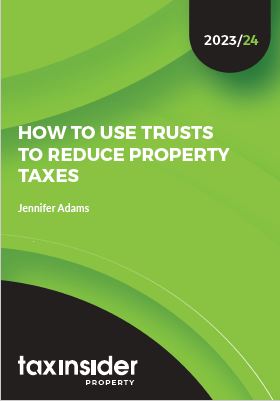
------------------------
For more in depth discussion on this important area of property taxation, please see our recently updated report ‘How to Use Trusts to Reduce Property Taxes’.
------------------------
Trusts are essentially a break in the ownership of an asset between the legal owner (the trustee) and the beneficial owner, i.e., the person or people who can enjoy that asset (the beneficiary). For the person who creates the trust (the settlor), there can be numerous benefits – for tax and non-tax reasons.
Tax benefits
For the settlor, placing an asset into trust is a way of removing it from their estate for inheritance tax (IHT) purposes – after seven years, that asset will be outside of their estate. An immediate IHT charge of 20% (or 25% if paid by the settlor) will be the impact of transfers of value above the prevailing nil-rate band (NRB - £325,000 since 2009 and due to remain as such until 2028).
Despite the possibility of this IHT charge, there will be no capital gains tax (CGT) payable when assets are placed into trust – irrespective of what the asset is, even investment in nature. Under s 260 IHTA 1984, holdover relief is available to the settlor on the basis of there being an IHT charge (even if that charge is £nil being within the NRB). Assets which may be pregnant with large gains, crystalised as a dry CGT charge if gifted directly to individuals, can be avoided if settled into a trust for that individual (unless that individual is the settlor themselves, their spouse or minor or unmarried children). The availability of s 260 holdover is often the biggest tax advantage for trusts. Assets can also be placed into trust via a settlor’s will upon their death; whilst that also avoids CGT, doing so would not provide any IHT benefits on the settlor’s death.
Trusts resident outside of the UK and settled by non-UK domiciled individuals can protect non-UK situs assets from UK IHT, even if the settlor is UK resident. UK assets, apart from residential property, can benefit from these ‘excluded property trusts’ if enveloped within non-UK companies or partnerships. Complex tax avoidance rules mean that the settlor or beneficiaries can suffer wider UK tax burdens if they reside within the UK and still benefit from the trust, but for offshore asset preservation, which exists for the provision of non-residents, offshore trusts can be very useful.
Non-tax benefits
The main non-tax benefit is keeping the family silver safe. Beneficiaries can benefit from the trust assets – receive income or capital, utilise the asset, e.g., live in a property rent-free, or operate their business using those assets; however, the legal ownership lies safely elsewhere. The beneficiaries may be in an unstable marriage – assets within an established trust may be immune from a future divorce settlement; the beneficiary might be too young, inexperienced (or maybe even too unreliable) to manage and own the asset, so the trustees can hold it as guardian and ensure the asset survives. Trusts can last up to 125 years, so there are multiple generations who can be provided for. Family businesses, such as farms, are often held in trust to ensure the business will survive for those future generations.
Disadvantages
As useful as trusts may be to relieve a settlor of assets to reduce the value of their chargeable estates or protect assets from the dangers of direct ownership, trusts may not be suitable for everyone. Every ten years, most trusts will be subject to IHT above the value of the NRB; discretionary trustees are subject to additional rate income tax and higher rates of CGT with only half an annual exemption. Settlors, their spouses or their minor or unmarried children cannot benefit from the trust if full tax benefits are to be realised, and set-up and ongoing compliance costs (tax returns or trust registration service) may blunt the tax savings.
Practical tips
Trusts are useful for tax and succession or asset preservation purposes; however, they are not suitable in all cases. The high income tax rates for discretionary trusts, for example, might render them prohibitive, as might the ongoing costs and inability for a settlor to benefit from the trust during their lifetime.



